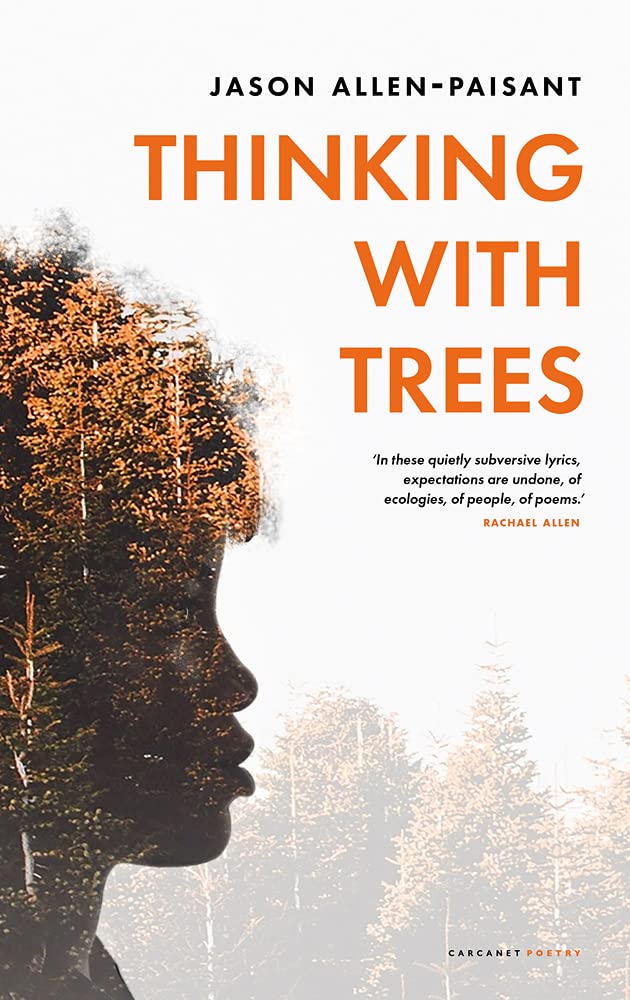Jason Allen-Paisant is perhaps best known for his celebrated second collection Self-Portrait as Othello, which won the T.S. Eliot Prize and the Forward Prize in the same year (2023). In this daring ekphrastic experiment, the poet portraits himself as Othello across the urban landscapes of modern London, Paris and Venice. In honour of this historic win, and of the inaugural edition of Summit: A Poetry School Festival – an ecopoetry, nature, and climate writing symposium – I would like to revisit Allen-Paisant’s leafier first collection Thinking with Trees, along with the fruitful lessons we can learn from the book’s deep-rooted connections to the arboreal world.
Frolic and Fantasy, in Nature
Broadly speaking, the collection traces a series of walks through Roundhay Park, near Allen-Paisant’s home in Leeds, but this is no scenic postcard. Instead, as in ‘Essay on Dog Walking (II)’, the speaker trembles in ‘terror’ at ‘the white boys // with pitbulls’ and the strangers lurking in the undergrowth with ‘knives’ (‘Crossing the Threshold’). ‘I glance over my shoulder […] not persuaded / that someone has not stumbled / off the path and into the bush / behind me’, he admits (‘Listen’). Instead of bucolic escapism, the writing bears witness to the universalising fantasy associated with places of retreat and contemplation: peace of mind is not an equally accessible resource.
Keeping memory
As dogs attack his ankles, the speaker is reminded of the slave-master’s ‘dog on the plantation […] barking / ripping / flesh / this mauling / of the Black body / the violence that made / White life possible’ (‘Essay on Dog Walking’). Perspective is constantly rerouted and rooted in the past. Here, it is not birds that call out in the present but rather the speaker’s pained ancestors. Their stories are locked inside the trees and sing out their ‘hallelujahs’ for those who escape and ‘steal away’ (‘For Those Who Steal Away’); recalling the ‘musical tree’ poems of the likes of Massillon Coicou. The Haitian poet Coicou writes of a ‘path’ that ‘vibrates, in endless hymns’ to the ‘wild music / of the trees […] all the voices / that make up the dazzling fanfare of the forest’ in ‘Impressions, 92’.
Each tree stands as a totemic ‘memorial’ to the ‘souls’ of enslaved Black ‘people long dead […] in war and rebellion’ – their ‘leaves / keep memory’, like a clock keeps time (‘For Those Who Steal Away’). With the landscape haunted by a history of white domination, it becomes a battleground of trauma, where the collective memories of past and present violently collide. In this way, Thinking with Trees suggests that idyllic projections of the urban pastoral remain out of reach to racialised subjectivity, at least as it is presented in this collection. As the speaker explains in ‘Leisure (II)’, ‘[p]eople who live in the wake of slavery and plantation, we / know we must always be on guard’.
Ecological Enquiry
At the same time, there is an intricate web of ecological inquiry running parallel to these concerns. One of three direct engagements with ecological issues appears in ‘Logwood’, when Allen-Paisant examines the ‘depletion of forests’ in dialogue with the devastation of the transatlantic slave trade.The poem’s declared task is ‘log- / ging broken // histories’, referring through its ‘logs of dying’ not only to felled trees but also to flawed logbooks and their ‘erasures’ of enslaved humans.
A second direct treatment appears in ‘Vein of Stone amid the Branches’ when Allen-Paisant critiques deforestation’s ‘trailer crane bulldozer / fission’. This poem also addresses the ‘weight’ of ‘nuclear’ technology that forces, through pollution, ‘uranium trees [to] mate in nuclear forests’. And then in ‘Treeness’, comparisons are drawn between the enslaved ancestor of the speaker who was not ‘entitled to time’ (‘we don’t have time / to waste / hawk de near’) and the present fate of ‘woodlands / [that] have been cut down’ until ‘land has no time for itself’.
If Trees could Talk…
There is intellectual activism in embracing a ‘different idea of what human is’, but this activism is not conveyed through the loud, forcefulness we might associate with a protest march. Instead, it is rooted in quiet, emotional resonance between the speaker and the trees – both testify intimately to being perceived as commodities, along with the stakes of upholding such a destructive worldview. In ‘Going Still’, he painfully admits that ‘I even think a handicapped dog / is a person in ways I cannot be’. ‘Shout at me! /Let me feel like a person’, he pleads… After declaring the collection to be filled with ‘the words / of a classroom of trees’, the speaker pursues a more empathetic, less extractive vision of the world.
It is a vision in which trees are modelled as ‘answers to our needs / not objects of our desire’. This ambition is briefly interrupted here by the anthropocentric configuration of trees as ‘answers’ to human needs, as opposed to ecological beings with agendas of their own. Perhaps trees do not need to answer to anything other than the soil in which they are rooted. Even so, Thinking with Trees reaches admirably toward a compassionate engagement with the non-human world.
Deep-time, Curiosity and Control
In ‘Roots’, subjectivity begins to slip rhizomatically into ‘a thousand selves / and more’. It is not a perspective that confines itself solely to human ‘selves’, either. The speaker recalls how ‘for hours I would / turn into something else […] one of those brown or green lizards’; his thoughts even aligning with those of ‘a caterpillar’s’. His mind then mulches further into vegetation, with his ‘shadow blending with those of the vines’ in ‘Cho-Cho Walks’. Later in this poem, he describes ‘becoming flesh of the flesh of the leaves’; the cyclicity of nature conveyed through prepositional repetition and a dizzying spectacle of deep-time.
Although playful and whimsically reminiscent of childhood adventure, the animalistic and vegetative transformation of the speaker in Thinking with Trees attests to the urgency of moving beyond anthropocentrism in ecological debates and ceasing to centralise human concerns. The speaker condemns what he calls the ‘too human gaze’, and forces by way of our complicity, a reckoning with our own relation to the more-than-human world.
The evolving ecological consciousness presented in this collection also elevates the importance of curiosity over control. ‘I want to know more / about the roots that nourish the rocks / that keep them tall and flourishing’, we learn in ‘Roots’. Bravely, this is not a collection that pretends to hold the answers. Instead, it suggests that perhaps only an open mind can help us find the best path forward.In some ways, this idea is reflected in the use of form too. There is an open-endedness at play through the absence of full stops, and the shifting play on line structure as poems are placed on the page.
On Nature, and History
What is particularly interesting to me is how the traumatic load the speaker carries allows him to relate intimately to the ‘water tumbling / over rocks a load I do not need to carry’, as in ‘Finding Space (II)’. This trauma also encourages him to enter into direct ‘conversation / with this form of water’. In this way, the collection displays a reverence for what some people call ‘storied matter’; those narratives in which human and nonhuman bodies become as mutually entwined as the parkland shrubbery. It is a mindset that allows even inanimate materials like rocks, water and twigs to be held in our imagination closer and with more compassion. As the speaker summarises, ‘to go walking in these woods is to face a different idea of what human is’; at times uncomfortable yet urgently required.
In Thinking with Trees, Allen-Paisant urges us to rethink our relationship with both nature and history, past and present. We are challenged to listen more carefully to the voices of the silenced, human and non-human and everything in between. The leafy reflections offer lessons in how we might coexist with the world around us, rooted in curiosity and compassion rather than domination and control.
Jade Cuttle is a BBC New Generation Thinker and former Arts Commissioning Editor at The Times, completing AHRC-funded research into the work of poets of colour writing about the natural world at the University of Cambridge. www.jadecuttle.co.uk / @JadeCuttle


Add your Reply
You must be logged in to post a comment.